Organisational Behaviour Report: LG's Team Dynamics and Culture
VerifiedAdded on 2020/10/22
|13
|3897
|257
Report
AI Summary
This report provides an analysis of the organisational behaviour within LG, a multinational electronics company. It explores the influence of organisational politics, culture, and power on team and individual performance, examining how these factors affect employee interaction and strategy implementation. The report delves into Handy's culture model to classify LG's organisational culture, focusing on power, role, and task cultures. It further evaluates content and process theories of motivation, including Maslow's hierarchy of needs and Vroom's expectancy theory, and discusses their application in enhancing employee productivity and engagement. The report also contrasts effective and ineffective teams within LG, identifying challenges such as the 'Bamboo ceiling' and racial discrimination, and suggests strategies for fostering a more positive and productive work environment. Finally, it examines philosophies and concepts of organisational behaviour, providing a comprehensive overview of LG's internal dynamics and potential areas for improvement.
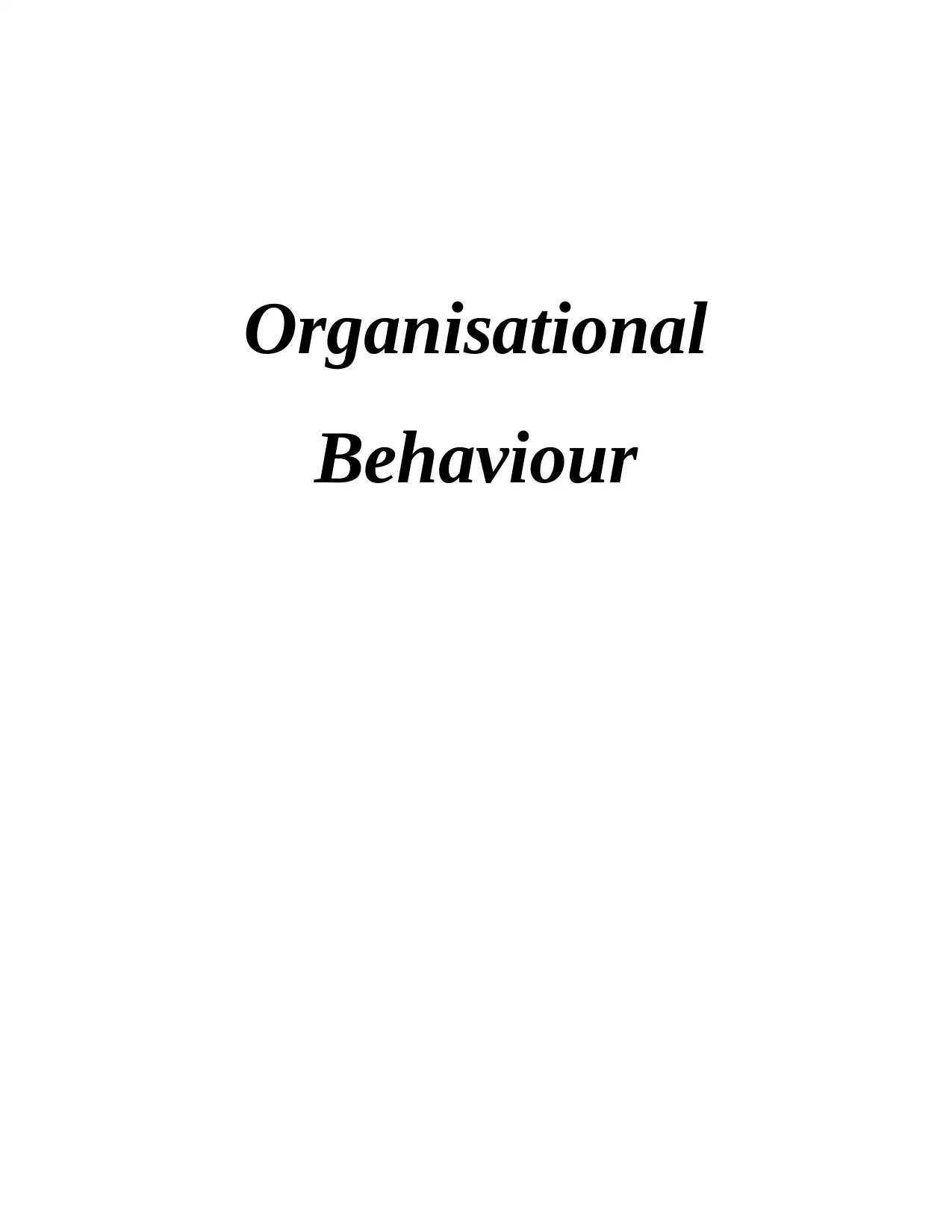
Organisational
Behaviour
Behaviour
Paraphrase This Document
Need a fresh take? Get an instant paraphrase of this document with our AI Paraphraser
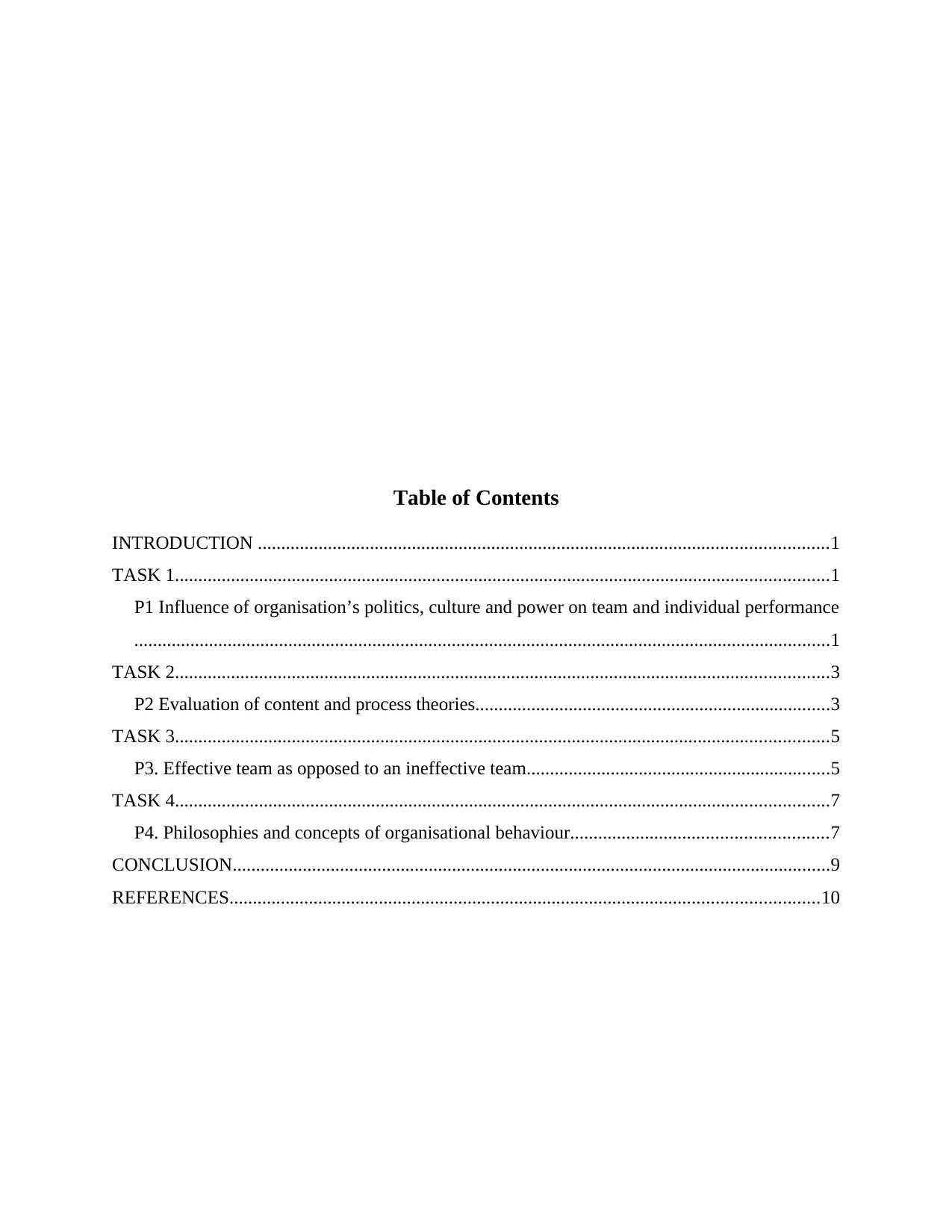
Table of Contents
INTRODUCTION ..........................................................................................................................1
TASK 1............................................................................................................................................1
P1 Influence of organisation’s politics, culture and power on team and individual performance
.....................................................................................................................................................1
TASK 2............................................................................................................................................3
P2 Evaluation of content and process theories............................................................................3
TASK 3............................................................................................................................................5
P3. Effective team as opposed to an ineffective team.................................................................5
TASK 4............................................................................................................................................7
P4. Philosophies and concepts of organisational behaviour.......................................................7
CONCLUSION................................................................................................................................9
REFERENCES..............................................................................................................................10
INTRODUCTION ..........................................................................................................................1
TASK 1............................................................................................................................................1
P1 Influence of organisation’s politics, culture and power on team and individual performance
.....................................................................................................................................................1
TASK 2............................................................................................................................................3
P2 Evaluation of content and process theories............................................................................3
TASK 3............................................................................................................................................5
P3. Effective team as opposed to an ineffective team.................................................................5
TASK 4............................................................................................................................................7
P4. Philosophies and concepts of organisational behaviour.......................................................7
CONCLUSION................................................................................................................................9
REFERENCES..............................................................................................................................10

⊘ This is a preview!⊘
Do you want full access?
Subscribe today to unlock all pages.

Trusted by 1+ million students worldwide
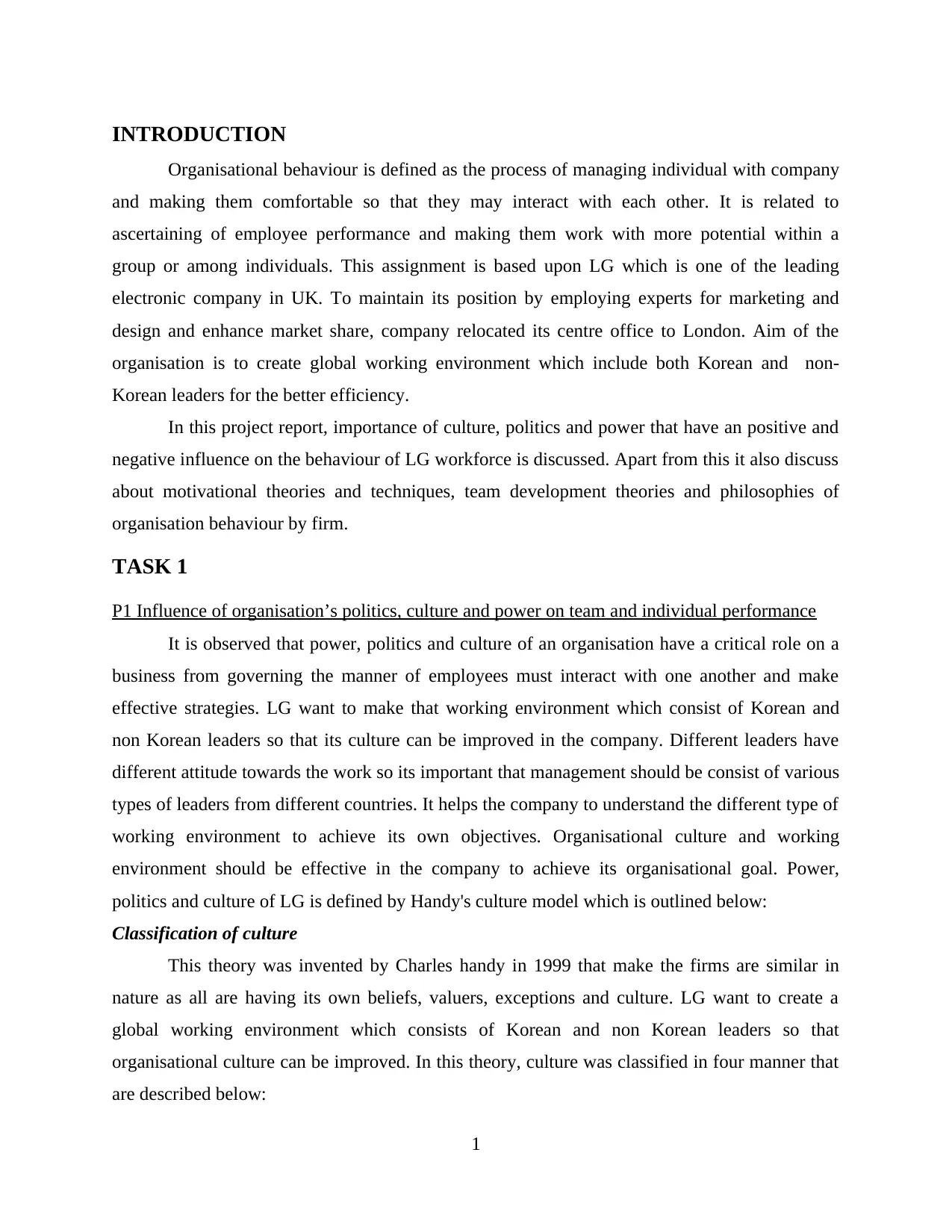
INTRODUCTION
Organisational behaviour is defined as the process of managing individual with company
and making them comfortable so that they may interact with each other. It is related to
ascertaining of employee performance and making them work with more potential within a
group or among individuals. This assignment is based upon LG which is one of the leading
electronic company in UK. To maintain its position by employing experts for marketing and
design and enhance market share, company relocated its centre office to London. Aim of the
organisation is to create global working environment which include both Korean and non-
Korean leaders for the better efficiency.
In this project report, importance of culture, politics and power that have an positive and
negative influence on the behaviour of LG workforce is discussed. Apart from this it also discuss
about motivational theories and techniques, team development theories and philosophies of
organisation behaviour by firm.
TASK 1
P1 Influence of organisation’s politics, culture and power on team and individual performance
It is observed that power, politics and culture of an organisation have a critical role on a
business from governing the manner of employees must interact with one another and make
effective strategies. LG want to make that working environment which consist of Korean and
non Korean leaders so that its culture can be improved in the company. Different leaders have
different attitude towards the work so its important that management should be consist of various
types of leaders from different countries. It helps the company to understand the different type of
working environment to achieve its own objectives. Organisational culture and working
environment should be effective in the company to achieve its organisational goal. Power,
politics and culture of LG is defined by Handy's culture model which is outlined below:
Classification of culture
This theory was invented by Charles handy in 1999 that make the firms are similar in
nature as all are having its own beliefs, valuers, exceptions and culture. LG want to create a
global working environment which consists of Korean and non Korean leaders so that
organisational culture can be improved. In this theory, culture was classified in four manner that
are described below:
1
Organisational behaviour is defined as the process of managing individual with company
and making them comfortable so that they may interact with each other. It is related to
ascertaining of employee performance and making them work with more potential within a
group or among individuals. This assignment is based upon LG which is one of the leading
electronic company in UK. To maintain its position by employing experts for marketing and
design and enhance market share, company relocated its centre office to London. Aim of the
organisation is to create global working environment which include both Korean and non-
Korean leaders for the better efficiency.
In this project report, importance of culture, politics and power that have an positive and
negative influence on the behaviour of LG workforce is discussed. Apart from this it also discuss
about motivational theories and techniques, team development theories and philosophies of
organisation behaviour by firm.
TASK 1
P1 Influence of organisation’s politics, culture and power on team and individual performance
It is observed that power, politics and culture of an organisation have a critical role on a
business from governing the manner of employees must interact with one another and make
effective strategies. LG want to make that working environment which consist of Korean and
non Korean leaders so that its culture can be improved in the company. Different leaders have
different attitude towards the work so its important that management should be consist of various
types of leaders from different countries. It helps the company to understand the different type of
working environment to achieve its own objectives. Organisational culture and working
environment should be effective in the company to achieve its organisational goal. Power,
politics and culture of LG is defined by Handy's culture model which is outlined below:
Classification of culture
This theory was invented by Charles handy in 1999 that make the firms are similar in
nature as all are having its own beliefs, valuers, exceptions and culture. LG want to create a
global working environment which consists of Korean and non Korean leaders so that
organisational culture can be improved. In this theory, culture was classified in four manner that
are described below:
1
Paraphrase This Document
Need a fresh take? Get an instant paraphrase of this document with our AI Paraphraser
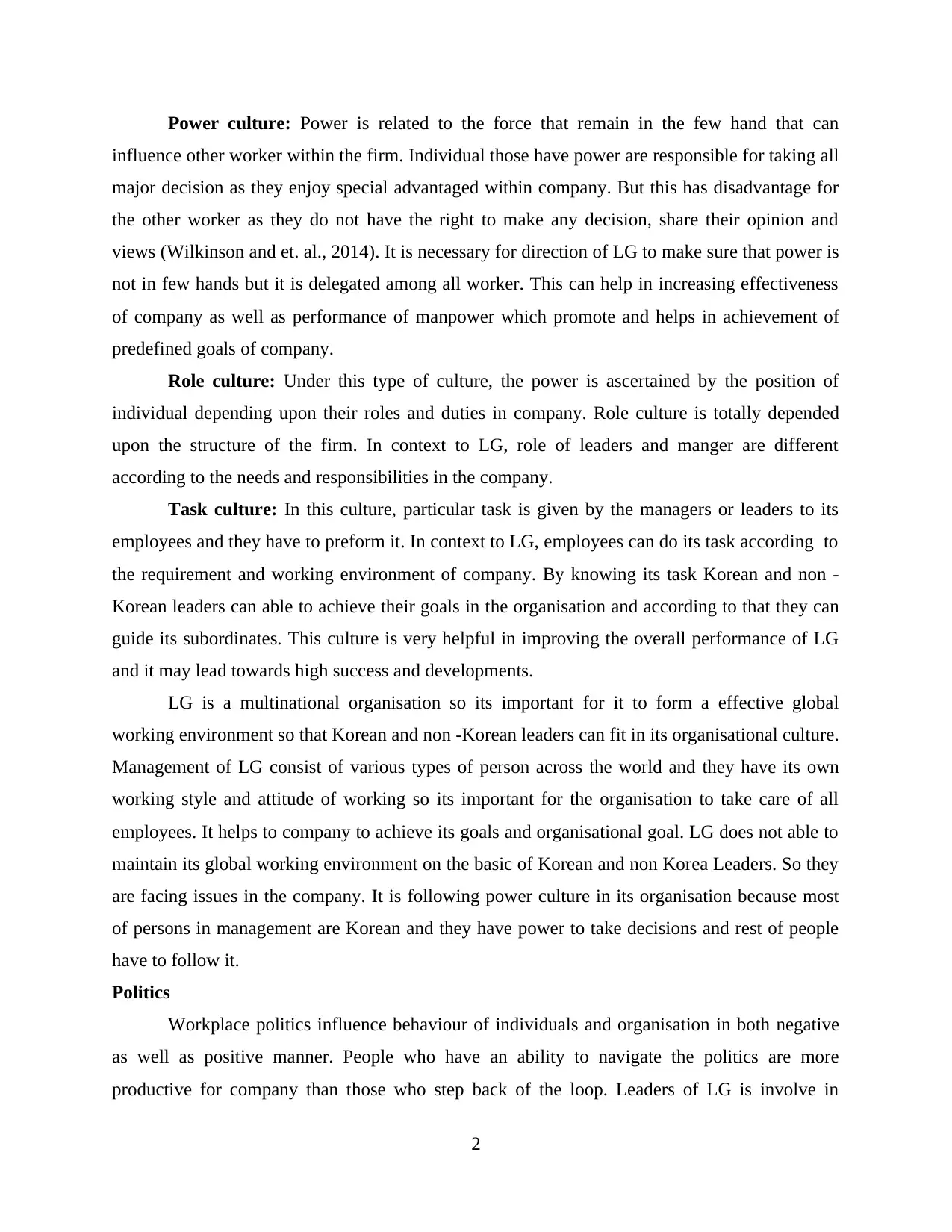
Power culture: Power is related to the force that remain in the few hand that can
influence other worker within the firm. Individual those have power are responsible for taking all
major decision as they enjoy special advantaged within company. But this has disadvantage for
the other worker as they do not have the right to make any decision, share their opinion and
views (Wilkinson and et. al., 2014). It is necessary for direction of LG to make sure that power is
not in few hands but it is delegated among all worker. This can help in increasing effectiveness
of company as well as performance of manpower which promote and helps in achievement of
predefined goals of company.
Role culture: Under this type of culture, the power is ascertained by the position of
individual depending upon their roles and duties in company. Role culture is totally depended
upon the structure of the firm. In context to LG, role of leaders and manger are different
according to the needs and responsibilities in the company.
Task culture: In this culture, particular task is given by the managers or leaders to its
employees and they have to preform it. In context to LG, employees can do its task according to
the requirement and working environment of company. By knowing its task Korean and non -
Korean leaders can able to achieve their goals in the organisation and according to that they can
guide its subordinates. This culture is very helpful in improving the overall performance of LG
and it may lead towards high success and developments.
LG is a multinational organisation so its important for it to form a effective global
working environment so that Korean and non -Korean leaders can fit in its organisational culture.
Management of LG consist of various types of person across the world and they have its own
working style and attitude of working so its important for the organisation to take care of all
employees. It helps to company to achieve its goals and organisational goal. LG does not able to
maintain its global working environment on the basic of Korean and non Korea Leaders. So they
are facing issues in the company. It is following power culture in its organisation because most
of persons in management are Korean and they have power to take decisions and rest of people
have to follow it.
Politics
Workplace politics influence behaviour of individuals and organisation in both negative
as well as positive manner. People who have an ability to navigate the politics are more
productive for company than those who step back of the loop. Leaders of LG is involve in
2
influence other worker within the firm. Individual those have power are responsible for taking all
major decision as they enjoy special advantaged within company. But this has disadvantage for
the other worker as they do not have the right to make any decision, share their opinion and
views (Wilkinson and et. al., 2014). It is necessary for direction of LG to make sure that power is
not in few hands but it is delegated among all worker. This can help in increasing effectiveness
of company as well as performance of manpower which promote and helps in achievement of
predefined goals of company.
Role culture: Under this type of culture, the power is ascertained by the position of
individual depending upon their roles and duties in company. Role culture is totally depended
upon the structure of the firm. In context to LG, role of leaders and manger are different
according to the needs and responsibilities in the company.
Task culture: In this culture, particular task is given by the managers or leaders to its
employees and they have to preform it. In context to LG, employees can do its task according to
the requirement and working environment of company. By knowing its task Korean and non -
Korean leaders can able to achieve their goals in the organisation and according to that they can
guide its subordinates. This culture is very helpful in improving the overall performance of LG
and it may lead towards high success and developments.
LG is a multinational organisation so its important for it to form a effective global
working environment so that Korean and non -Korean leaders can fit in its organisational culture.
Management of LG consist of various types of person across the world and they have its own
working style and attitude of working so its important for the organisation to take care of all
employees. It helps to company to achieve its goals and organisational goal. LG does not able to
maintain its global working environment on the basic of Korean and non Korea Leaders. So they
are facing issues in the company. It is following power culture in its organisation because most
of persons in management are Korean and they have power to take decisions and rest of people
have to follow it.
Politics
Workplace politics influence behaviour of individuals and organisation in both negative
as well as positive manner. People who have an ability to navigate the politics are more
productive for company than those who step back of the loop. Leaders of LG is involve in
2
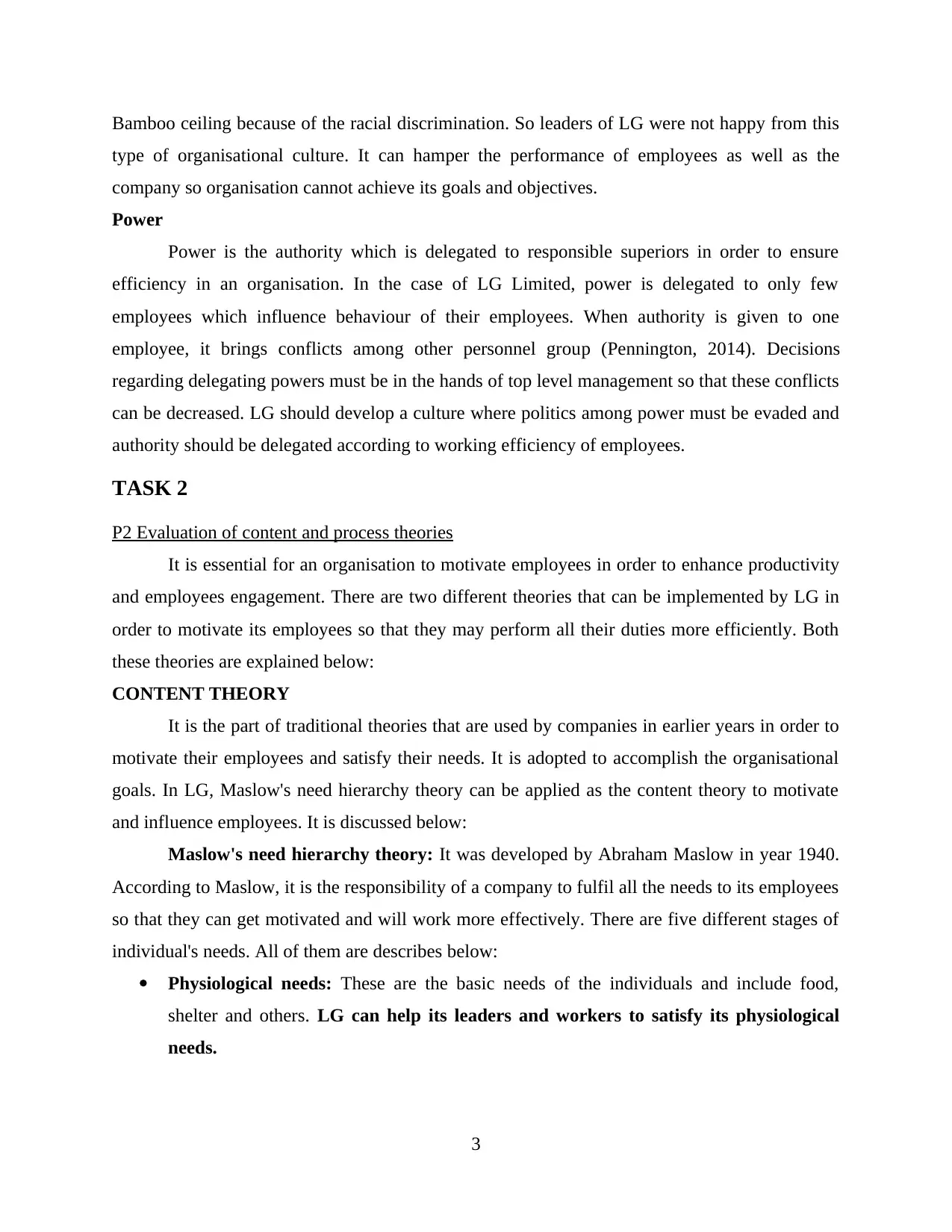
Bamboo ceiling because of the racial discrimination. So leaders of LG were not happy from this
type of organisational culture. It can hamper the performance of employees as well as the
company so organisation cannot achieve its goals and objectives.
Power
Power is the authority which is delegated to responsible superiors in order to ensure
efficiency in an organisation. In the case of LG Limited, power is delegated to only few
employees which influence behaviour of their employees. When authority is given to one
employee, it brings conflicts among other personnel group (Pennington, 2014). Decisions
regarding delegating powers must be in the hands of top level management so that these conflicts
can be decreased. LG should develop a culture where politics among power must be evaded and
authority should be delegated according to working efficiency of employees.
TASK 2
P2 Evaluation of content and process theories
It is essential for an organisation to motivate employees in order to enhance productivity
and employees engagement. There are two different theories that can be implemented by LG in
order to motivate its employees so that they may perform all their duties more efficiently. Both
these theories are explained below:
CONTENT THEORY
It is the part of traditional theories that are used by companies in earlier years in order to
motivate their employees and satisfy their needs. It is adopted to accomplish the organisational
goals. In LG, Maslow's need hierarchy theory can be applied as the content theory to motivate
and influence employees. It is discussed below:
Maslow's need hierarchy theory: It was developed by Abraham Maslow in year 1940.
According to Maslow, it is the responsibility of a company to fulfil all the needs to its employees
so that they can get motivated and will work more effectively. There are five different stages of
individual's needs. All of them are describes below:
Physiological needs: These are the basic needs of the individuals and include food,
shelter and others. LG can help its leaders and workers to satisfy its physiological
needs.
3
type of organisational culture. It can hamper the performance of employees as well as the
company so organisation cannot achieve its goals and objectives.
Power
Power is the authority which is delegated to responsible superiors in order to ensure
efficiency in an organisation. In the case of LG Limited, power is delegated to only few
employees which influence behaviour of their employees. When authority is given to one
employee, it brings conflicts among other personnel group (Pennington, 2014). Decisions
regarding delegating powers must be in the hands of top level management so that these conflicts
can be decreased. LG should develop a culture where politics among power must be evaded and
authority should be delegated according to working efficiency of employees.
TASK 2
P2 Evaluation of content and process theories
It is essential for an organisation to motivate employees in order to enhance productivity
and employees engagement. There are two different theories that can be implemented by LG in
order to motivate its employees so that they may perform all their duties more efficiently. Both
these theories are explained below:
CONTENT THEORY
It is the part of traditional theories that are used by companies in earlier years in order to
motivate their employees and satisfy their needs. It is adopted to accomplish the organisational
goals. In LG, Maslow's need hierarchy theory can be applied as the content theory to motivate
and influence employees. It is discussed below:
Maslow's need hierarchy theory: It was developed by Abraham Maslow in year 1940.
According to Maslow, it is the responsibility of a company to fulfil all the needs to its employees
so that they can get motivated and will work more effectively. There are five different stages of
individual's needs. All of them are describes below:
Physiological needs: These are the basic needs of the individuals and include food,
shelter and others. LG can help its leaders and workers to satisfy its physiological
needs.
3
⊘ This is a preview!⊘
Do you want full access?
Subscribe today to unlock all pages.

Trusted by 1+ million students worldwide
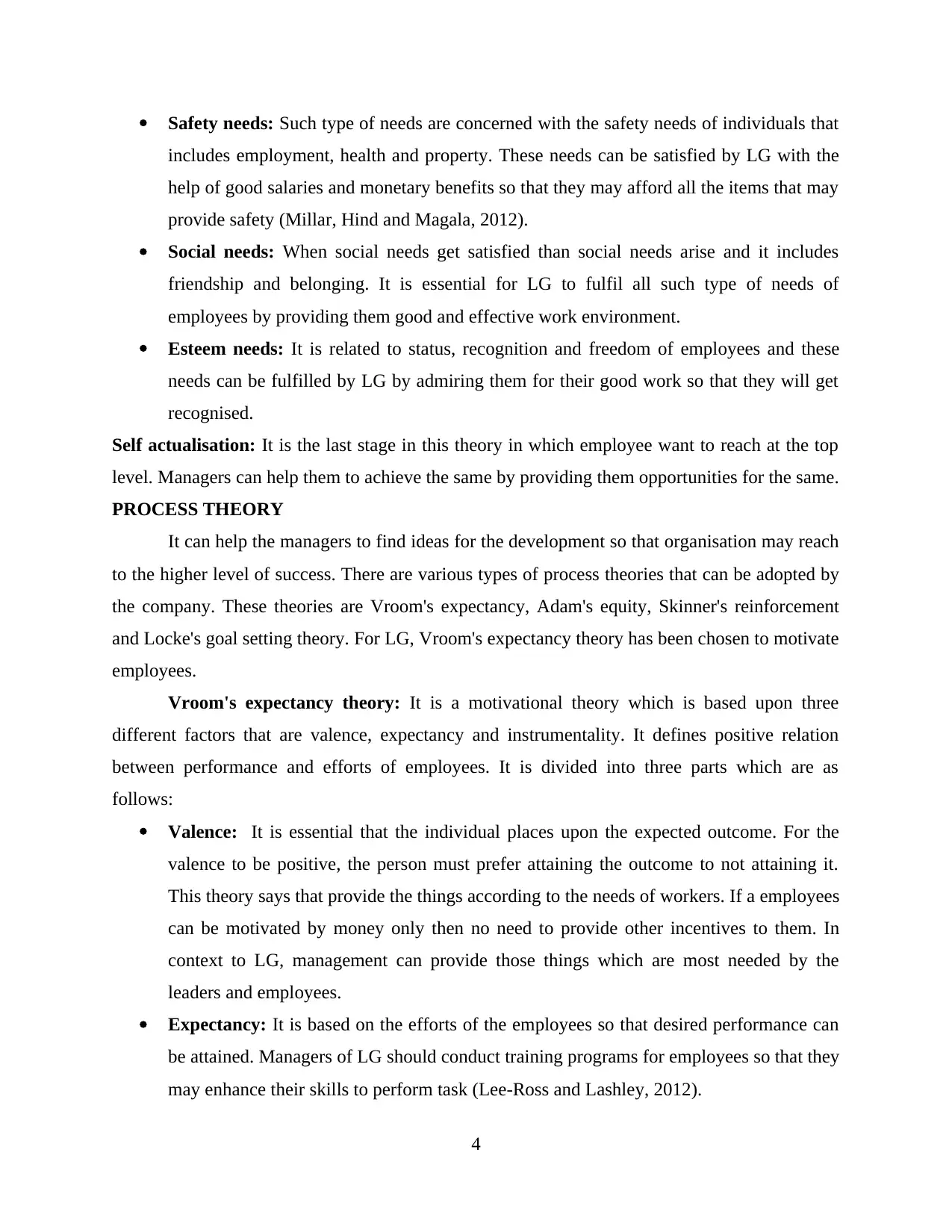
Safety needs: Such type of needs are concerned with the safety needs of individuals that
includes employment, health and property. These needs can be satisfied by LG with the
help of good salaries and monetary benefits so that they may afford all the items that may
provide safety (Millar, Hind and Magala, 2012).
Social needs: When social needs get satisfied than social needs arise and it includes
friendship and belonging. It is essential for LG to fulfil all such type of needs of
employees by providing them good and effective work environment.
Esteem needs: It is related to status, recognition and freedom of employees and these
needs can be fulfilled by LG by admiring them for their good work so that they will get
recognised.
Self actualisation: It is the last stage in this theory in which employee want to reach at the top
level. Managers can help them to achieve the same by providing them opportunities for the same.
PROCESS THEORY
It can help the managers to find ideas for the development so that organisation may reach
to the higher level of success. There are various types of process theories that can be adopted by
the company. These theories are Vroom's expectancy, Adam's equity, Skinner's reinforcement
and Locke's goal setting theory. For LG, Vroom's expectancy theory has been chosen to motivate
employees.
Vroom's expectancy theory: It is a motivational theory which is based upon three
different factors that are valence, expectancy and instrumentality. It defines positive relation
between performance and efforts of employees. It is divided into three parts which are as
follows:
Valence: It is essential that the individual places upon the expected outcome. For the
valence to be positive, the person must prefer attaining the outcome to not attaining it.
This theory says that provide the things according to the needs of workers. If a employees
can be motivated by money only then no need to provide other incentives to them. In
context to LG, management can provide those things which are most needed by the
leaders and employees.
Expectancy: It is based on the efforts of the employees so that desired performance can
be attained. Managers of LG should conduct training programs for employees so that they
may enhance their skills to perform task (Lee-Ross and Lashley, 2012).
4
includes employment, health and property. These needs can be satisfied by LG with the
help of good salaries and monetary benefits so that they may afford all the items that may
provide safety (Millar, Hind and Magala, 2012).
Social needs: When social needs get satisfied than social needs arise and it includes
friendship and belonging. It is essential for LG to fulfil all such type of needs of
employees by providing them good and effective work environment.
Esteem needs: It is related to status, recognition and freedom of employees and these
needs can be fulfilled by LG by admiring them for their good work so that they will get
recognised.
Self actualisation: It is the last stage in this theory in which employee want to reach at the top
level. Managers can help them to achieve the same by providing them opportunities for the same.
PROCESS THEORY
It can help the managers to find ideas for the development so that organisation may reach
to the higher level of success. There are various types of process theories that can be adopted by
the company. These theories are Vroom's expectancy, Adam's equity, Skinner's reinforcement
and Locke's goal setting theory. For LG, Vroom's expectancy theory has been chosen to motivate
employees.
Vroom's expectancy theory: It is a motivational theory which is based upon three
different factors that are valence, expectancy and instrumentality. It defines positive relation
between performance and efforts of employees. It is divided into three parts which are as
follows:
Valence: It is essential that the individual places upon the expected outcome. For the
valence to be positive, the person must prefer attaining the outcome to not attaining it.
This theory says that provide the things according to the needs of workers. If a employees
can be motivated by money only then no need to provide other incentives to them. In
context to LG, management can provide those things which are most needed by the
leaders and employees.
Expectancy: It is based on the efforts of the employees so that desired performance can
be attained. Managers of LG should conduct training programs for employees so that they
may enhance their skills to perform task (Lee-Ross and Lashley, 2012).
4
Paraphrase This Document
Need a fresh take? Get an instant paraphrase of this document with our AI Paraphraser
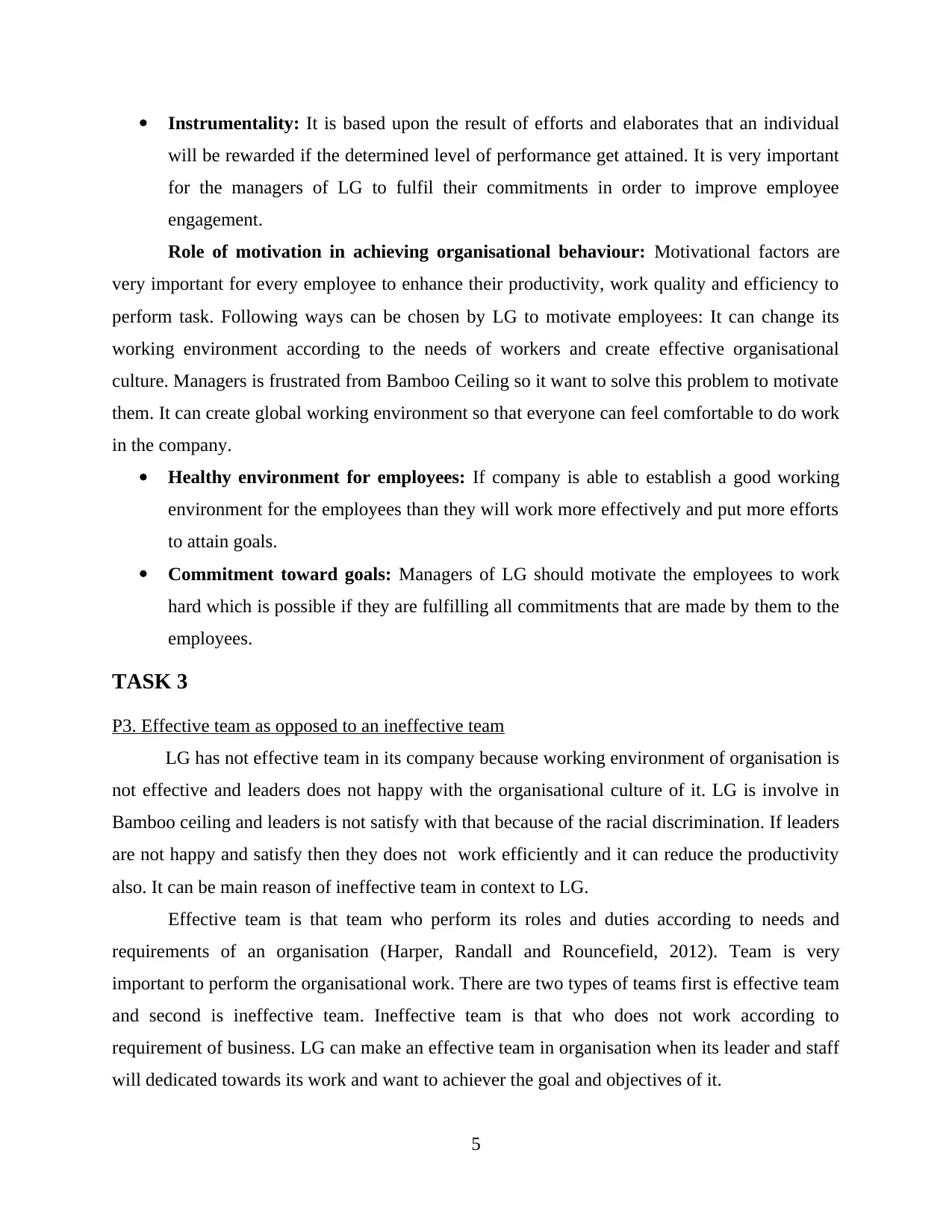
Instrumentality: It is based upon the result of efforts and elaborates that an individual
will be rewarded if the determined level of performance get attained. It is very important
for the managers of LG to fulfil their commitments in order to improve employee
engagement.
Role of motivation in achieving organisational behaviour: Motivational factors are
very important for every employee to enhance their productivity, work quality and efficiency to
perform task. Following ways can be chosen by LG to motivate employees: It can change its
working environment according to the needs of workers and create effective organisational
culture. Managers is frustrated from Bamboo Ceiling so it want to solve this problem to motivate
them. It can create global working environment so that everyone can feel comfortable to do work
in the company.
Healthy environment for employees: If company is able to establish a good working
environment for the employees than they will work more effectively and put more efforts
to attain goals.
Commitment toward goals: Managers of LG should motivate the employees to work
hard which is possible if they are fulfilling all commitments that are made by them to the
employees.
TASK 3
P3. Effective team as opposed to an ineffective team
LG has not effective team in its company because working environment of organisation is
not effective and leaders does not happy with the organisational culture of it. LG is involve in
Bamboo ceiling and leaders is not satisfy with that because of the racial discrimination. If leaders
are not happy and satisfy then they does not work efficiently and it can reduce the productivity
also. It can be main reason of ineffective team in context to LG.
Effective team is that team who perform its roles and duties according to needs and
requirements of an organisation (Harper, Randall and Rouncefield, 2012). Team is very
important to perform the organisational work. There are two types of teams first is effective team
and second is ineffective team. Ineffective team is that who does not work according to
requirement of business. LG can make an effective team in organisation when its leader and staff
will dedicated towards its work and want to achiever the goal and objectives of it.
5
will be rewarded if the determined level of performance get attained. It is very important
for the managers of LG to fulfil their commitments in order to improve employee
engagement.
Role of motivation in achieving organisational behaviour: Motivational factors are
very important for every employee to enhance their productivity, work quality and efficiency to
perform task. Following ways can be chosen by LG to motivate employees: It can change its
working environment according to the needs of workers and create effective organisational
culture. Managers is frustrated from Bamboo Ceiling so it want to solve this problem to motivate
them. It can create global working environment so that everyone can feel comfortable to do work
in the company.
Healthy environment for employees: If company is able to establish a good working
environment for the employees than they will work more effectively and put more efforts
to attain goals.
Commitment toward goals: Managers of LG should motivate the employees to work
hard which is possible if they are fulfilling all commitments that are made by them to the
employees.
TASK 3
P3. Effective team as opposed to an ineffective team
LG has not effective team in its company because working environment of organisation is
not effective and leaders does not happy with the organisational culture of it. LG is involve in
Bamboo ceiling and leaders is not satisfy with that because of the racial discrimination. If leaders
are not happy and satisfy then they does not work efficiently and it can reduce the productivity
also. It can be main reason of ineffective team in context to LG.
Effective team is that team who perform its roles and duties according to needs and
requirements of an organisation (Harper, Randall and Rouncefield, 2012). Team is very
important to perform the organisational work. There are two types of teams first is effective team
and second is ineffective team. Ineffective team is that who does not work according to
requirement of business. LG can make an effective team in organisation when its leader and staff
will dedicated towards its work and want to achiever the goal and objectives of it.
5
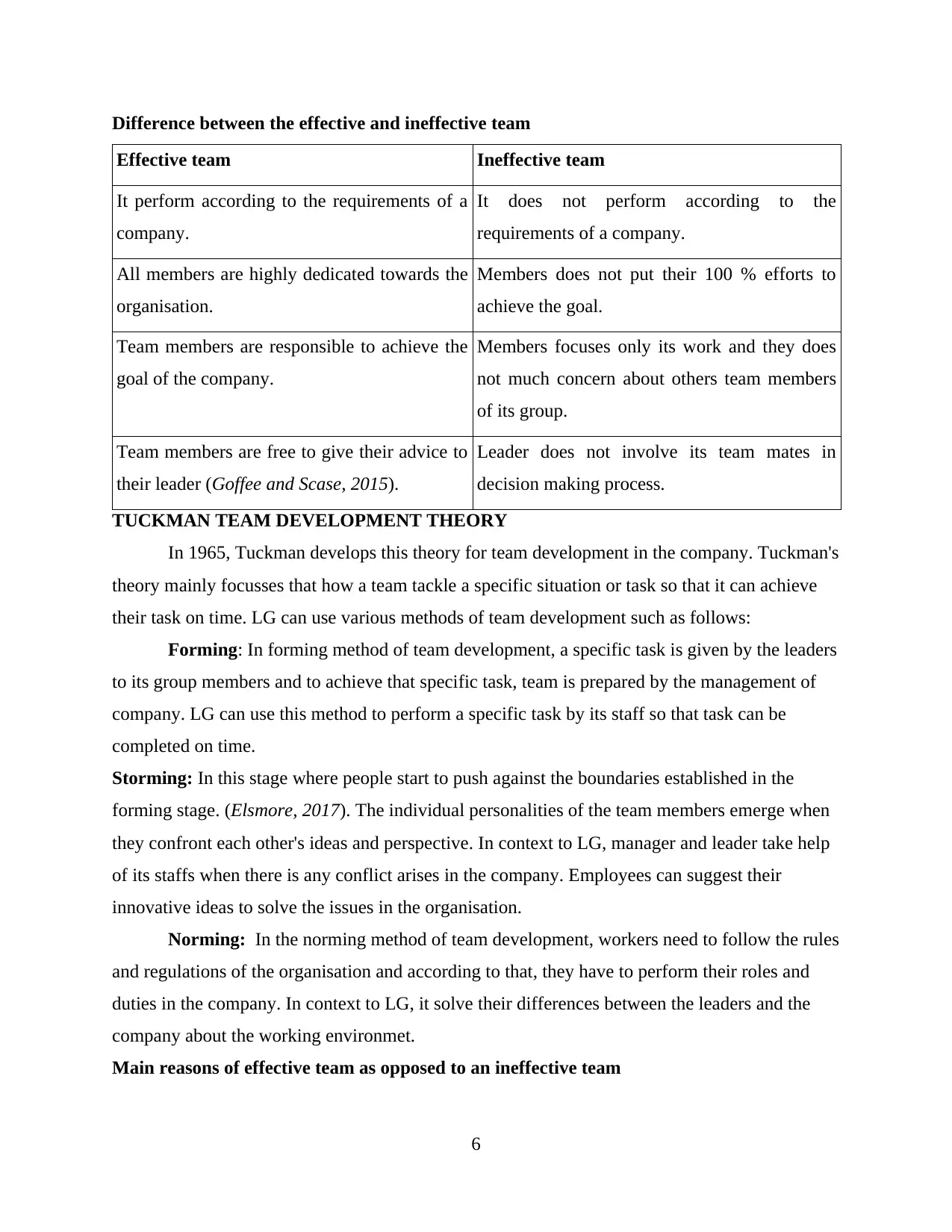
Difference between the effective and ineffective team
Effective team Ineffective team
It perform according to the requirements of a
company.
It does not perform according to the
requirements of a company.
All members are highly dedicated towards the
organisation.
Members does not put their 100 % efforts to
achieve the goal.
Team members are responsible to achieve the
goal of the company.
Members focuses only its work and they does
not much concern about others team members
of its group.
Team members are free to give their advice to
their leader (Goffee and Scase, 2015).
Leader does not involve its team mates in
decision making process.
TUCKMAN TEAM DEVELOPMENT THEORY
In 1965, Tuckman develops this theory for team development in the company. Tuckman's
theory mainly focusses that how a team tackle a specific situation or task so that it can achieve
their task on time. LG can use various methods of team development such as follows:
Forming: In forming method of team development, a specific task is given by the leaders
to its group members and to achieve that specific task, team is prepared by the management of
company. LG can use this method to perform a specific task by its staff so that task can be
completed on time.
Storming: In this stage where people start to push against the boundaries established in the
forming stage. (Elsmore, 2017). The individual personalities of the team members emerge when
they confront each other's ideas and perspective. In context to LG, manager and leader take help
of its staffs when there is any conflict arises in the company. Employees can suggest their
innovative ideas to solve the issues in the organisation.
Norming: In the norming method of team development, workers need to follow the rules
and regulations of the organisation and according to that, they have to perform their roles and
duties in the company. In context to LG, it solve their differences between the leaders and the
company about the working environmet.
Main reasons of effective team as opposed to an ineffective team
6
Effective team Ineffective team
It perform according to the requirements of a
company.
It does not perform according to the
requirements of a company.
All members are highly dedicated towards the
organisation.
Members does not put their 100 % efforts to
achieve the goal.
Team members are responsible to achieve the
goal of the company.
Members focuses only its work and they does
not much concern about others team members
of its group.
Team members are free to give their advice to
their leader (Goffee and Scase, 2015).
Leader does not involve its team mates in
decision making process.
TUCKMAN TEAM DEVELOPMENT THEORY
In 1965, Tuckman develops this theory for team development in the company. Tuckman's
theory mainly focusses that how a team tackle a specific situation or task so that it can achieve
their task on time. LG can use various methods of team development such as follows:
Forming: In forming method of team development, a specific task is given by the leaders
to its group members and to achieve that specific task, team is prepared by the management of
company. LG can use this method to perform a specific task by its staff so that task can be
completed on time.
Storming: In this stage where people start to push against the boundaries established in the
forming stage. (Elsmore, 2017). The individual personalities of the team members emerge when
they confront each other's ideas and perspective. In context to LG, manager and leader take help
of its staffs when there is any conflict arises in the company. Employees can suggest their
innovative ideas to solve the issues in the organisation.
Norming: In the norming method of team development, workers need to follow the rules
and regulations of the organisation and according to that, they have to perform their roles and
duties in the company. In context to LG, it solve their differences between the leaders and the
company about the working environmet.
Main reasons of effective team as opposed to an ineffective team
6
⊘ This is a preview!⊘
Do you want full access?
Subscribe today to unlock all pages.

Trusted by 1+ million students worldwide
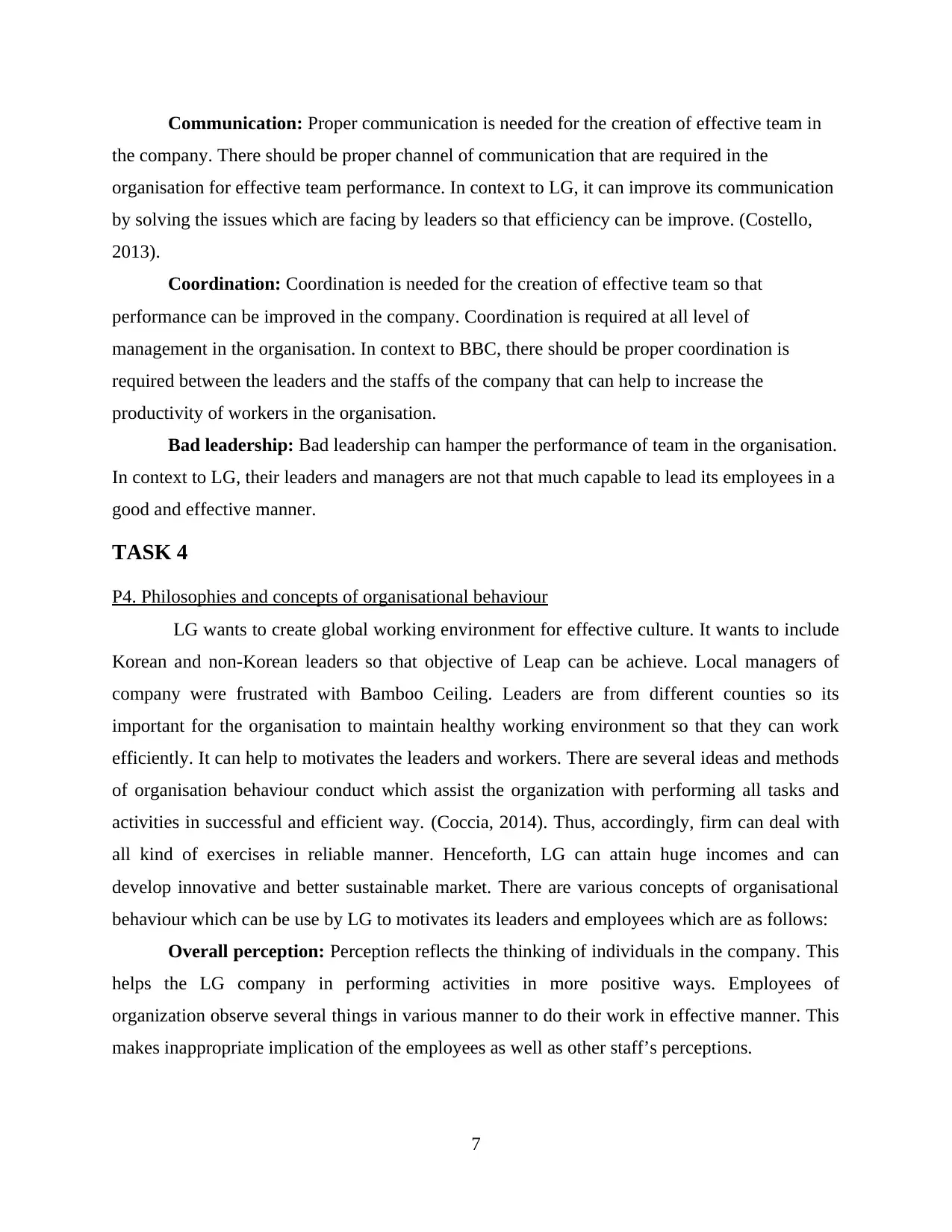
Communication: Proper communication is needed for the creation of effective team in
the company. There should be proper channel of communication that are required in the
organisation for effective team performance. In context to LG, it can improve its communication
by solving the issues which are facing by leaders so that efficiency can be improve. (Costello,
2013).
Coordination: Coordination is needed for the creation of effective team so that
performance can be improved in the company. Coordination is required at all level of
management in the organisation. In context to BBC, there should be proper coordination is
required between the leaders and the staffs of the company that can help to increase the
productivity of workers in the organisation.
Bad leadership: Bad leadership can hamper the performance of team in the organisation.
In context to LG, their leaders and managers are not that much capable to lead its employees in a
good and effective manner.
TASK 4
P4. Philosophies and concepts of organisational behaviour
LG wants to create global working environment for effective culture. It wants to include
Korean and non-Korean leaders so that objective of Leap can be achieve. Local managers of
company were frustrated with Bamboo Ceiling. Leaders are from different counties so its
important for the organisation to maintain healthy working environment so that they can work
efficiently. It can help to motivates the leaders and workers. There are several ideas and methods
of organisation behaviour conduct which assist the organization with performing all tasks and
activities in successful and efficient way. (Coccia, 2014). Thus, accordingly, firm can deal with
all kind of exercises in reliable manner. Henceforth, LG can attain huge incomes and can
develop innovative and better sustainable market. There are various concepts of organisational
behaviour which can be use by LG to motivates its leaders and employees which are as follows:
Overall perception: Perception reflects the thinking of individuals in the company. This
helps the LG company in performing activities in more positive ways. Employees of
organization observe several things in various manner to do their work in effective manner. This
makes inappropriate implication of the employees as well as other staff’s perceptions.
7
the company. There should be proper channel of communication that are required in the
organisation for effective team performance. In context to LG, it can improve its communication
by solving the issues which are facing by leaders so that efficiency can be improve. (Costello,
2013).
Coordination: Coordination is needed for the creation of effective team so that
performance can be improved in the company. Coordination is required at all level of
management in the organisation. In context to BBC, there should be proper coordination is
required between the leaders and the staffs of the company that can help to increase the
productivity of workers in the organisation.
Bad leadership: Bad leadership can hamper the performance of team in the organisation.
In context to LG, their leaders and managers are not that much capable to lead its employees in a
good and effective manner.
TASK 4
P4. Philosophies and concepts of organisational behaviour
LG wants to create global working environment for effective culture. It wants to include
Korean and non-Korean leaders so that objective of Leap can be achieve. Local managers of
company were frustrated with Bamboo Ceiling. Leaders are from different counties so its
important for the organisation to maintain healthy working environment so that they can work
efficiently. It can help to motivates the leaders and workers. There are several ideas and methods
of organisation behaviour conduct which assist the organization with performing all tasks and
activities in successful and efficient way. (Coccia, 2014). Thus, accordingly, firm can deal with
all kind of exercises in reliable manner. Henceforth, LG can attain huge incomes and can
develop innovative and better sustainable market. There are various concepts of organisational
behaviour which can be use by LG to motivates its leaders and employees which are as follows:
Overall perception: Perception reflects the thinking of individuals in the company. This
helps the LG company in performing activities in more positive ways. Employees of
organization observe several things in various manner to do their work in effective manner. This
makes inappropriate implication of the employees as well as other staff’s perceptions.
7
Paraphrase This Document
Need a fresh take? Get an instant paraphrase of this document with our AI Paraphraser
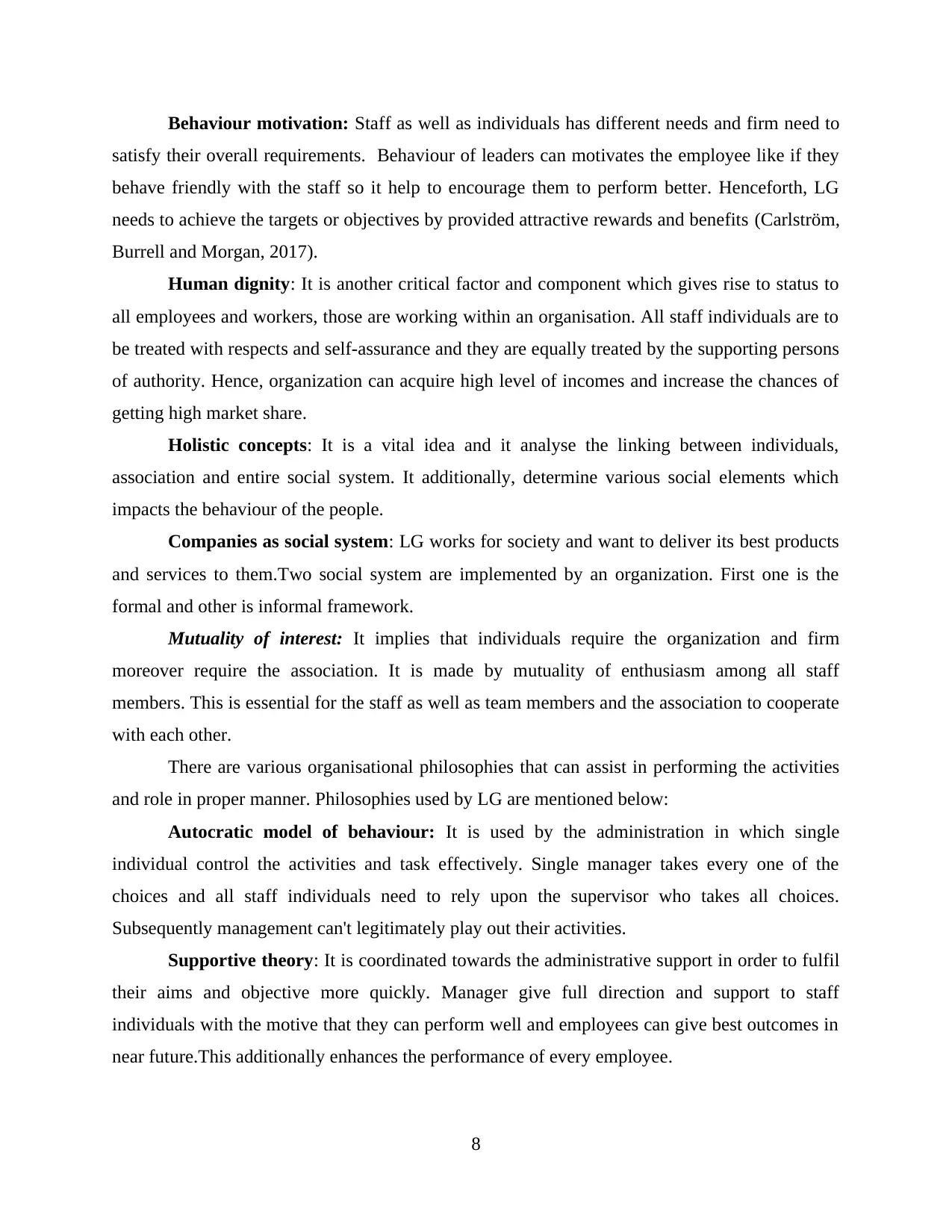
Behaviour motivation: Staff as well as individuals has different needs and firm need to
satisfy their overall requirements. Behaviour of leaders can motivates the employee like if they
behave friendly with the staff so it help to encourage them to perform better. Henceforth, LG
needs to achieve the targets or objectives by provided attractive rewards and benefits (Carlström,
Burrell and Morgan, 2017).
Human dignity: It is another critical factor and component which gives rise to status to
all employees and workers, those are working within an organisation. All staff individuals are to
be treated with respects and self-assurance and they are equally treated by the supporting persons
of authority. Hence, organization can acquire high level of incomes and increase the chances of
getting high market share.
Holistic concepts: It is a vital idea and it analyse the linking between individuals,
association and entire social system. It additionally, determine various social elements which
impacts the behaviour of the people.
Companies as social system: LG works for society and want to deliver its best products
and services to them.Two social system are implemented by an organization. First one is the
formal and other is informal framework.
Mutuality of interest: It implies that individuals require the organization and firm
moreover require the association. It is made by mutuality of enthusiasm among all staff
members. This is essential for the staff as well as team members and the association to cooperate
with each other.
There are various organisational philosophies that can assist in performing the activities
and role in proper manner. Philosophies used by LG are mentioned below:
Autocratic model of behaviour: It is used by the administration in which single
individual control the activities and task effectively. Single manager takes every one of the
choices and all staff individuals need to rely upon the supervisor who takes all choices.
Subsequently management can't legitimately play out their activities.
Supportive theory: It is coordinated towards the administrative support in order to fulfil
their aims and objective more quickly. Manager give full direction and support to staff
individuals with the motive that they can perform well and employees can give best outcomes in
near future.This additionally enhances the performance of every employee.
8
satisfy their overall requirements. Behaviour of leaders can motivates the employee like if they
behave friendly with the staff so it help to encourage them to perform better. Henceforth, LG
needs to achieve the targets or objectives by provided attractive rewards and benefits (Carlström,
Burrell and Morgan, 2017).
Human dignity: It is another critical factor and component which gives rise to status to
all employees and workers, those are working within an organisation. All staff individuals are to
be treated with respects and self-assurance and they are equally treated by the supporting persons
of authority. Hence, organization can acquire high level of incomes and increase the chances of
getting high market share.
Holistic concepts: It is a vital idea and it analyse the linking between individuals,
association and entire social system. It additionally, determine various social elements which
impacts the behaviour of the people.
Companies as social system: LG works for society and want to deliver its best products
and services to them.Two social system are implemented by an organization. First one is the
formal and other is informal framework.
Mutuality of interest: It implies that individuals require the organization and firm
moreover require the association. It is made by mutuality of enthusiasm among all staff
members. This is essential for the staff as well as team members and the association to cooperate
with each other.
There are various organisational philosophies that can assist in performing the activities
and role in proper manner. Philosophies used by LG are mentioned below:
Autocratic model of behaviour: It is used by the administration in which single
individual control the activities and task effectively. Single manager takes every one of the
choices and all staff individuals need to rely upon the supervisor who takes all choices.
Subsequently management can't legitimately play out their activities.
Supportive theory: It is coordinated towards the administrative support in order to fulfil
their aims and objective more quickly. Manager give full direction and support to staff
individuals with the motive that they can perform well and employees can give best outcomes in
near future.This additionally enhances the performance of every employee.
8
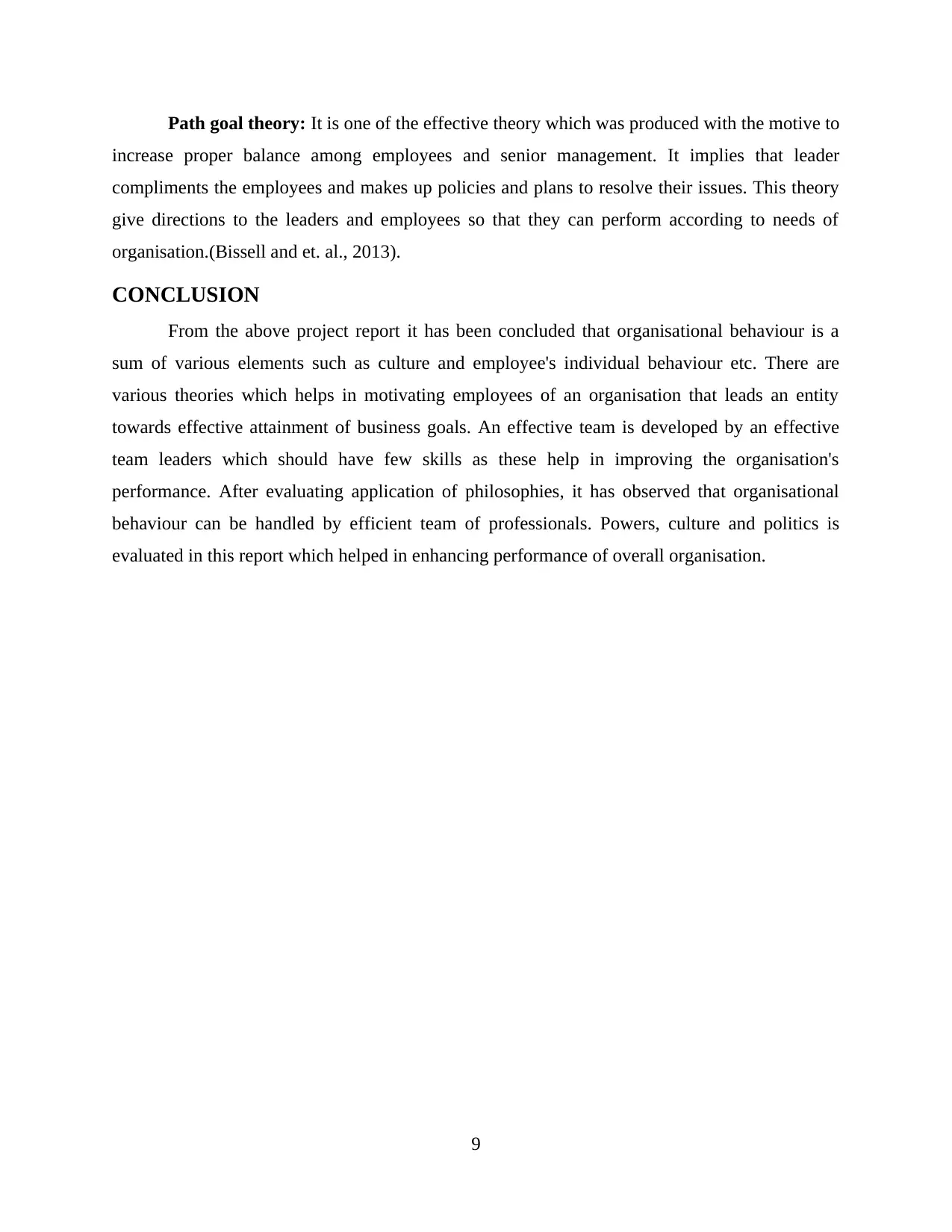
Path goal theory: It is one of the effective theory which was produced with the motive to
increase proper balance among employees and senior management. It implies that leader
compliments the employees and makes up policies and plans to resolve their issues. This theory
give directions to the leaders and employees so that they can perform according to needs of
organisation.(Bissell and et. al., 2013).
CONCLUSION
From the above project report it has been concluded that organisational behaviour is a
sum of various elements such as culture and employee's individual behaviour etc. There are
various theories which helps in motivating employees of an organisation that leads an entity
towards effective attainment of business goals. An effective team is developed by an effective
team leaders which should have few skills as these help in improving the organisation's
performance. After evaluating application of philosophies, it has observed that organisational
behaviour can be handled by efficient team of professionals. Powers, culture and politics is
evaluated in this report which helped in enhancing performance of overall organisation.
9
increase proper balance among employees and senior management. It implies that leader
compliments the employees and makes up policies and plans to resolve their issues. This theory
give directions to the leaders and employees so that they can perform according to needs of
organisation.(Bissell and et. al., 2013).
CONCLUSION
From the above project report it has been concluded that organisational behaviour is a
sum of various elements such as culture and employee's individual behaviour etc. There are
various theories which helps in motivating employees of an organisation that leads an entity
towards effective attainment of business goals. An effective team is developed by an effective
team leaders which should have few skills as these help in improving the organisation's
performance. After evaluating application of philosophies, it has observed that organisational
behaviour can be handled by efficient team of professionals. Powers, culture and politics is
evaluated in this report which helped in enhancing performance of overall organisation.
9
⊘ This is a preview!⊘
Do you want full access?
Subscribe today to unlock all pages.

Trusted by 1+ million students worldwide
1 out of 13
Related Documents
Your All-in-One AI-Powered Toolkit for Academic Success.
+13062052269
info@desklib.com
Available 24*7 on WhatsApp / Email
![[object Object]](/_next/static/media/star-bottom.7253800d.svg)
Unlock your academic potential
Copyright © 2020–2026 A2Z Services. All Rights Reserved. Developed and managed by ZUCOL.





